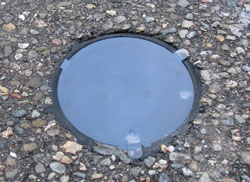The parking space at the University of Maryland College Park has now been enhanced with the Smart Parking Space Program, which informs the visitors about the available parking spaces.
This new program provides information like availability of electric vehicle charging stations as well. The set smartphone application named “Parker” is included in the program. The University announced the implementation of this program during the introductory event of the new electric vehicle (EV) charging stations from Coulomb technologies. The Smart Parking program was implemented to reduce the effect on the environment brought about by student and visitor car parking issues.
 Streetline Embedded Sensor
Streetline Embedded Sensor
Ultra-low power wireless sensors that are stationed in each parking space are the heart of the Smart parking program. These sensors detect the presence of a car and transmit the information to a set of web and mobile application (including Parker). The sensors are present at select garages and parking lots having EV charging stations, which include Union Lane Garage, Stadium Drive Garage, Regents Garage, and between Mowatt Lane Garage and Lot U4. The “Parker” gives an indication if the EV space is available irrespective of the usage status of the charger. Even at some of the metered parking spaces in the Campus they plan to deploy the sensors.
The Streetline program that was first deployed was an ultra-low power mesh network that detects the presence of a vehicle in the parking space. This program also incorporated the parking policy management facilitating dynamic pricing (for metered parking spaces) and also guided the motorists on the availability of space. In a further enhancement to this system, it would be linked to the web and will function as a 24/7 information system for parking space availability.
Zia Yusuf, the CEO of Streetline saw this opportunity of implementing the Smart Parking program at University of Maryland as an initiative for similar implementations at many other campuses across the U.S. David Allen, who is in charge of the Transportation Service at the University highlighted the environmental benefits of deploying the Smart Parking sensor in making the Campus a cleaner place.